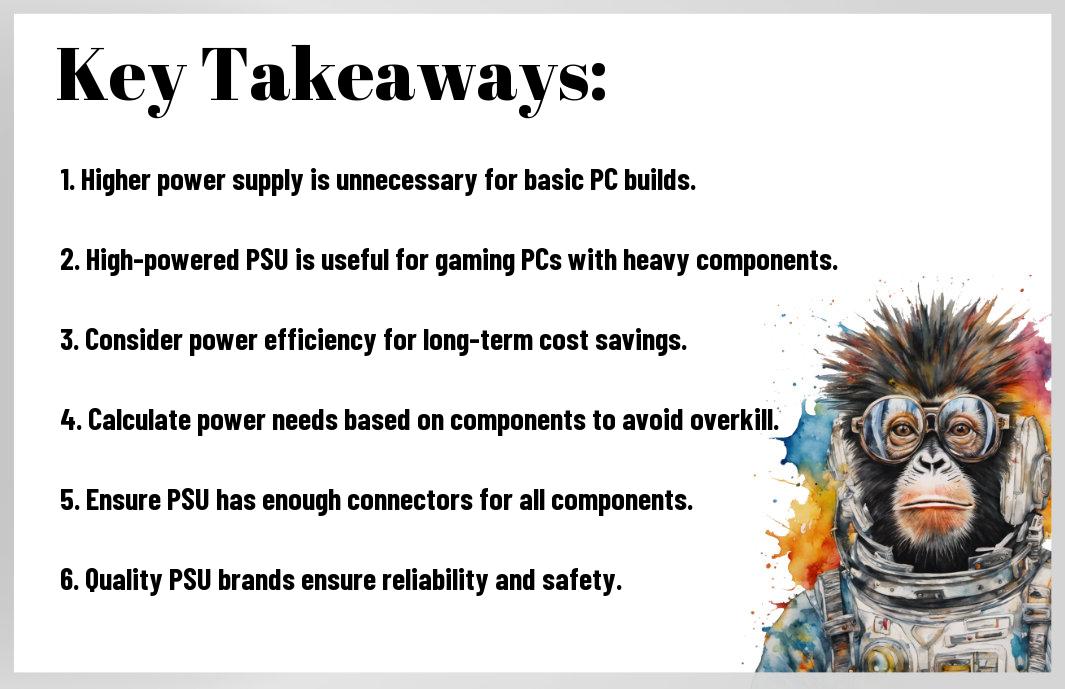PC builders, when it comes to constructing your dream machine, the power supply is a critical component that should not be overlooked. The right power supply can make or break your system’s performance, stability, and even longevity. While it may be tempting to skimp on this part, investing in a high-powered power supply is crucial for ensuring your components receive the proper amount of electricity, preventing potential damage, crashes, or even fires. Let’s examine whether you truly need a high-powered power supply for your next PC build.
Key Takeaways:
- Assess Power Needs: Evaluate the power requirements of your components to determine the necessary wattage for your power supply.
- Consider Future Upgrades: Anticipate any future upgrades or additions to your build that may require more power.
- Quality Over Quantity: Focus on the quality and efficiency of the power supply rather than solely on the wattage.
- Modularity: Opt for a modular power supply to simplify cable management and improve airflow in your PC build.
- Brand Reputation: Choose a reliable brand with a good reputation for power supplies to ensure the longevity and safety of your PC build.

Understanding Wattage: The Gritty Truth About Power
Mythbusting PC Power Myths
Power up, tech enthusiasts! It’s time to debunk some common misconceptions about power supplies for your PC build. One of the biggest myths is that you need a high-powered PSU for any type of computer setup. The truth is, matching the wattage of your power supply to your actual needs can save you money while ensuring optimal performance. Don’t fall for the hype – it’s all about finding the right balance for your specific setup.
The Real Deal on Wattage Needs for Different PC Uses
Any PC builder worth their salt knows that the wattage requirements for different setups can vary drastically. Gaming rigs with high-end graphics cards and overclocked processors will naturally require more power than a basic office PC. Understanding your specific needs is crucial to avoiding underpowered systems that can lead to crashes or even hardware damage. It’s not just about the number of watts – it’s about matching the power supply to your usage patterns.
In the context of understanding wattage needs, consider factors like the components you’re using, planned upgrades, and how long your PC will be running at peak performance. Investing in a quality power supply that meets your current and future needs is key to a stable, reliable system. Don’t skimp on power – it’s the lifeblood of your PC!
Size Matters: Finding the Sweet Spot
Balancing Act: Power Supply and PC Components
All successful PC builds require a delicate balance between power supply and components. Choosing the right power supply is crucial to ensure stable and efficient performance for your PC. Overspending on a high-powered PSU that exceeds your system’s needs can lead to unnecessary expenses while opting for a lower-powered unit may result in instability or underperformance.
Overkill or Future-Proofing? The High-Powered PSU Debate
When considering power supplies, the age-old question is whether you should go for overkill or future-proof your system. Investing in a high-powered PSU can provide headroom for upgrades and expansions down the line, making it a worthwhile consideration for enthusiasts and power users. However, for average users, it may be more cost-effective to stick to a PSU that matches their current requirements rather than overshooting for the future.
Another necessary point to consider in the high-powered PSU debate is efficiency. While higher wattage power supplies can offer greater headroom and flexibility, they may operate less efficiently at lower loads, leading to wasted energy and increased electricity bills. It’s necessary to strike a balance between power capacity and efficiency to ensure optimal performance and cost-effectiveness.
Cash Rules: The Budgeting Game
The Cost of Power: Is a High-Powered PSU Worth Your Dollars?
Game on! Concerning building your PC, the power supply unit (PSU) plays a crucial role. The question is, do you really need to splurge on a high-powered PSU? Here’s the deal – while a high-powered PSU may come with a higher price tag, it can provide more stable power delivery, better efficiency, and the ability to support power-hungry components. If you’re planning on running a high-end gaming rig or a workstation with multiple GPUs, investing in a high-powered PSU might be a smart move. Bear in mind, in the long run, it can save you from potential system crashes and hardware damage.
The Efficiency Factor: Spending Now to Save Later
Efficiency is the name of the game when it comes to selecting a power supply for your PC. While opting for a high-powered PSU may require a larger upfront investment, the efficiency gains can lead to long-term cost savings. A more efficient PSU not only wastes less power as heat but also runs quieter and cooler, prolonging the lifespan of your components. It’s a win-win situation for both your wallet and your system’s performance.
With a high-quality, efficient PSU, you can ensure stable power delivery, lower energy bills, and a quieter computing experience. Investing a bit more upfront can result in significant cost savings and performance gains over time. Bear in mind, when it comes to budgeting for your PC build, it’s not just about the initial expenses but also about the long-term benefits. Choose wisely, game changers!
Summing up
Presently, determining whether you need a high-powered power supply for your PC build ultimately depends on your specific build requirements and future upgrade plans. It’s crucial to consider factors like the components you’re using, power efficiency, and potential for expansion. Be mindful of, investing in a quality power supply can provide stability and longevity to your system. So, do your research, assess your needs, and make a decision that aligns with your goals and budget. Don’t overlook the importance of a reliable power supply when building your dream PC!
FAQ
Q: Why is having a high-powered power supply important for a PC build?
A: Having a high-powered power supply ensures that your PC components receive a stable and consistent power supply, reducing the risk of damage and ensuring optimal performance.
Q: How do I determine what wattage of power supply I need for my PC build?
A: To determine the wattage of power supply you need, calculate the total power consumption of your components and choose a power supply that exceeds that wattage to allow for future upgrades.
Q: Can using a power supply with lower wattage than recommended affect my PC’s performance?
A: Yes, using a power supply with lower wattage than recommended can cause stability issues, crashes, and even damage to your components due to inadequate power delivery.
Q: Are high-powered power supplies more energy-efficient than lower-powered ones?
A: High-powered power supplies are generally more efficient when operating at higher loads, as they are designed to deliver power more efficiently, saving energy and reducing electricity costs in the long run.
Q: What are some reputable brands known for producing high-powered power supplies for PC builds?
A: Some reputable brands known for producing high-quality high-powered power supplies include Corsair, EVGA, Seasonic, and Thermaltake. It’s important to choose a trusted brand to ensure reliability and performance for your PC build.


![VALORANT $10 Gift Card - PC [Online Game Code]](https://m.media-amazon.com/images/I/41IGhWA1O6L._SX300_SY300_QL70_ML2_.jpg)

